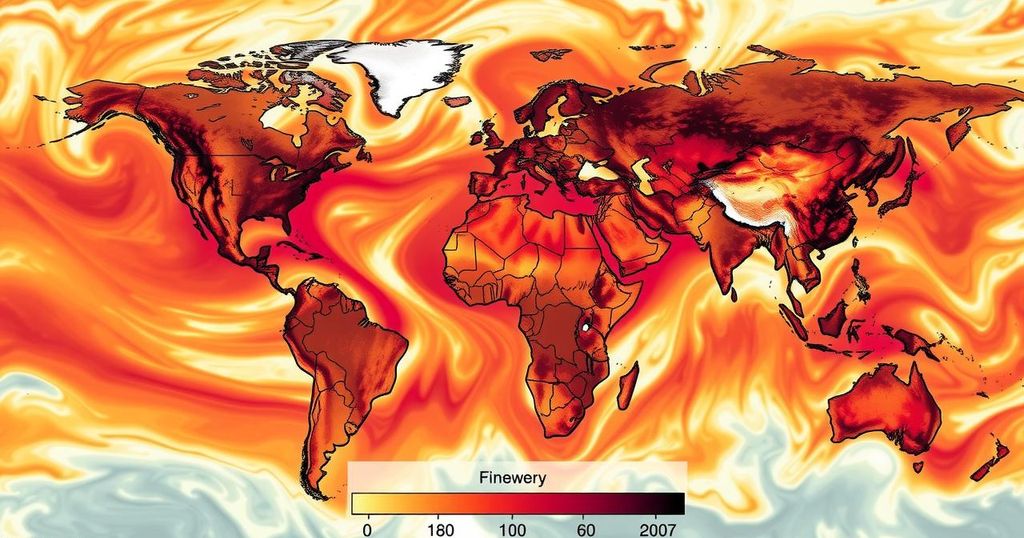In 2024, human-caused climate change led to an average of 41 additional days of dangerous heat globally, with severe implications for weather patterns and human health. The study revealed that extreme weather events were more frequent and severe due to these temperatures. Researchers warned that without significant action to combat climate change, these trends are likely to worsen, especially in vulnerable countries.
In 2024, human-induced climate change resulted in an alarming average increase of 41 days of dangerous heat across the globe. A study conducted by World Weather Attribution and Climate Central highlighted the intensifying impact of climate change on extreme weather events, revealing that heatwaves, droughts, and severe storms were exacerbated by this phenomenon. This unprecedented year is projected to be one of the hottest on record, significantly affecting the lives and livelihoods of millions worldwide.
The consequences of this extreme heat were felt universally, as Northern California and Death Valley experienced extreme temperatures, while regions of Mexico and Central America suffered severe heat. Notably, the already vulnerable populations in West Africa faced heightened risks during this period. In addition, schools in parts of South and Southeast Asia were compelled to close due to the extreme heat, underscoring the pervasive impact of rising temperatures. The analysis concluded that, without immediate action to curb fossil fuel emissions, such severe heat events will likely intensify further.
Researchers examined daily temperature data from 2024 against a hypothetical scenario devoid of climate change factors. Their findings are still subject to peer review, although they employed credible peer-reviewed methodologies. Shockingly, some regions experienced over 150 days of extreme heat linked to climate change. Moreover, researchers noted a troubling trend: poorer nations are disproportionately affected, with Kristina Dahl stating, “The poorest, least developed countries on the planet are the places that are experiencing even higher numbers.”
Heat-related fatalities remain significantly underreported, making it challenging to raise awareness about the lethal nature of heatwaves. “Heat waves are by far the deadliest extreme event, and they are the extreme events where climate change is a real game changer,” Friederike Otto emphasized. This year serves as a stark reminder of how close the planet is to surpassing the 1.5 degrees Celsius threshold established by the Paris Agreement.
The study investigated 29 severe weather events that caused at least 3,700 fatalities and displaced millions, of which 26 exhibited strong correlations to climate change. While the El Niño phenomenon contributed to some severe weather scenarios, researchers underscored that climate change had a much more significant impact on 2024’s climate events. Rising ocean temperatures and atmospheric heat were fundamental factors in the increased severity of storms and rainfall patterns.
Experts, such as Jennifer Francis from the Woodwell Climate Research Center, concurred with the study’s findings, stating, “Extreme weather will continue to become more frequent, intense, destructive, costly, and deadly until we can lower the concentration of heat-trapping gases in the atmosphere.” The United Nations Environment Programme warned that continued reliance on fossil fuels would exacerbate climate extremes.
However, there are proactive measures countries can adopt to mitigate these impacts, as highlighted by Julie Arrighi from the Red Cross Red Crescent Climate Centre. By enhancing preparedness and adaptive measures against climate change, nations can better shelter their populations from these climate-induced hazards.
This comprehensive analysis reflects an urgent call to action for global leaders to prioritize strategies that address climate change effectively, as the ramifications of inaction will only lead to greater human suffering and environmental degradation.
In recent years, the influence of climate change on extreme weather events has become a widely recognized fact among scientists. The rising global temperatures, predominantly fueled by human activities such as fossil fuel combustion, have led to an increase in the frequency and intensity of extreme weather scenarios, including heatwaves, droughts, and storms. The urgency of addressing climate change has been further underscored by formal agreements like the Paris Agreement, which aims to limit global warming. Understanding the consequences of climate change is crucial for policymakers and the public alike, highlighting the need for concrete action to prevent further warming and its devastating effects.
The findings from 2024 indicate a concerning trend of increasing dangerous heat days resulting from human-induced climate change. Researchers emphasize the need for urgent global action to combat fossil fuel dependency to mitigate the impacts of extreme heat and associated weather events. The disproportionate effects on poorer nations necessitate targeted interventions and preparations to safeguard vulnerable populations. As the world edges closer to critical temperature thresholds, immediate and concerted efforts are essential to avoid catastrophic climate outcomes.
Original Source: abcnews.go.com






